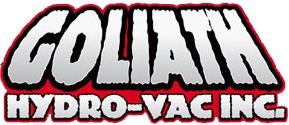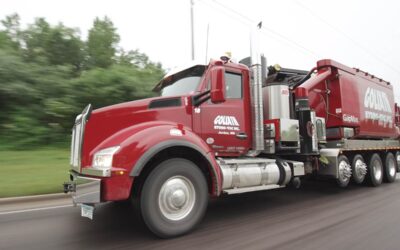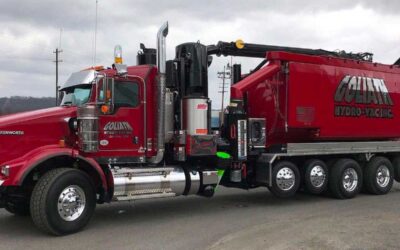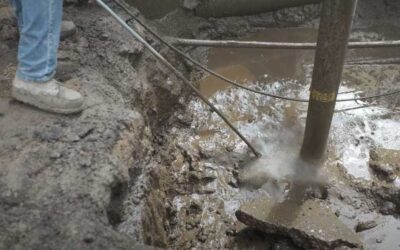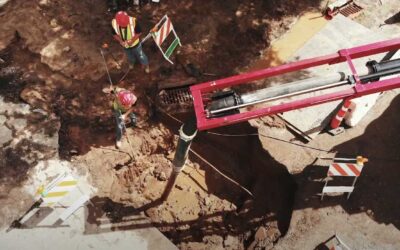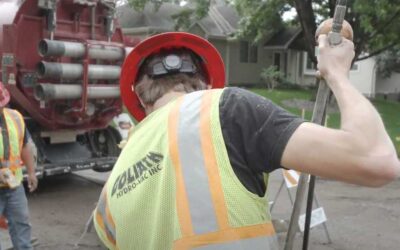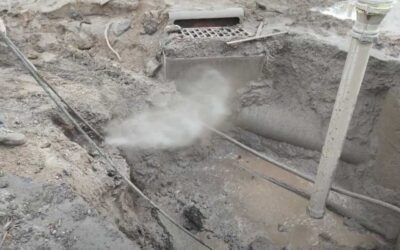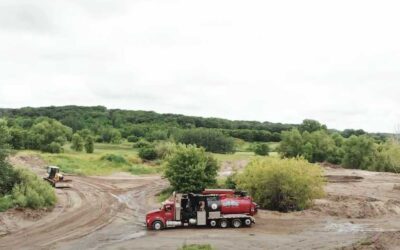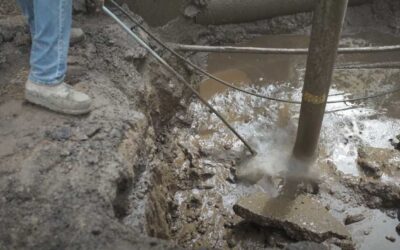Hydrovac Excavation 101: Everything You Need to Know
Hydrovac excavation has been around, in one form or another, for decades now. However, a lot of professionals that could benefit from this service still have questions about it. In this article, we’ll dig deep into those questions to find out what is hydrovac excavation, exactly, and what can it be used for.
Read on to learn about how this remarkable equipment works, where it’s used, its benefits vs. other excavation methods, and more.
What is Hydrovac Excavation?
Also known as hydro excavation or just hydrovac, hydrovac excavation is a method for quickly and completely removing soil, rocks, and other sediments using the combination of pressurized water and vacuum suction.
What is a hydrovac?
The hydrovac itself is the equipment used for hydro excavation. Typically mounted on a specialized truck, the hydrovac has several key components:
- Water tank
- Water pump
- High pressure water hose
- Vacuum pump
- Boom-mounted vacuum intake hose
- Debris tank
How does hydro excavation work?
The hydrovac excavator uses a water pump to send water from the tank out through a high-pressure hose in a precisely directed jet. The water begins breaking up the sediment immediately, creating a slurry. That slurry is simultaneously drawn away from the excavation site, through the vacuum intake hose and into the debris tank.
The result of this process is a perfectly excavated cavity, free from both water and sediment. To learn more about the specifics of hydro excavation, check out our blog post What is Hydro Excavation.
What is hydro excavation used for?
Many different projects and professions use hydrovac excavation these days. Its speed, safety, and cost-effectiveness make it especially useful for utility trenching and daylighting projects. Hydro excavation can be used directly over existing utilities without damaging them, making it a significantly faster and less risky choice than other excavation methods.
Cold-weather projects also benefit enormously from hydrovac excavation. Breaking up frozen ground by hand or even by backhoe is time intensive, labor intensive, and can be difficult to control. However, by using heated water, hydrovacs handle the job quickly while producing far neater and often more environmentally friendly results compared to other traditional excavation methods.
Yet another popular application for hydrovac excavation is environmental waste cleanup. The precision of the water jet combined with the immediate removal of disturbed material via vacuum are ideally suited to minimizing material blowing away or running off – a crucial factor when hazardous materials are being mitigated.
There are plenty more applications for hydro excavations on top of these three. To explore more use cases, check out this post: Projects Requiring Hydro Excavation.
Advantages of Using Hydro Excavation
We’ve already briefly mentioned the advantages of hydro excavation, namely its speed, safety, accuracy, and cost effectiveness. Now we’ll take a closer look at the facts that support these advantages. In short, what makes hydro excavation the right choice for a given project.
How long does hydro excavation take?
Historically, when precision was required, that meant hand digging. Hydro excavation is faster than hand digging in almost every conceivable scenario. Even a simple post hole, which a professional can dig in 10 to 20 minutes, hydro excavation can handle in less than five.
What’s more, while impediments like hard-packed soil or clay will slow down hand-digging significantly, they’ll have minimal impact on a hydrovac. The hydro jetting literally dissolves these challenges away.
As speedy as hydro excavation is, though, it can sometimes be subject to time challenges regarding the dumping and refilling process. Once the water tank is empty and/or the debris tank is full, the equipment must be taken to a dumping or refilling site before continuing the job. This can cause a delay if the dumping site is far removed from the project site. However, with a little planning, these delays can usually be prevented with strategies like using larger trucks or scheduling work in phases.
How accurate is hydro excavation?
The accuracy of hydrovac excavation is a major selling point. Unlike traditional excavation, where the heavy equipment operators are physically removed from the ground they’re excavating, a hydrovac operator is directing the high-pressure water jet by hand. This way, they can precisely control the excavation and ensure only the target area is disturbed.
Other factors, like water pressure and nozzle type, can also be adjusted to suit the project’s parameters and soil type. The resulting degree of precision has made hydrovac excavation an increasingly popular choice for delicate work like:
- Exposing utility lines
- Excavating piling holes
- Exposing foundations
- Exposing plumbing leaks
- Sign installation
How deep can a hydrovac go?
The maximum depth a hydrovac can excavate will vary depending on the machine itself and the type of sediment being removed. A depth of 20 to 30 feet is easily managed by almost any hydrovac, while more powerful machines can reach as deep as 60 to 70 feet down.
However, depth isn’t the only parameter to consider with hydrovac excavation. Distance from the truck is also an important calculation since the water and vacuum hoses are limited by boom length. If excavation needs to be carried out at a significant distance from a truck-accessible surface, it’s important to give this information to the hydro excavation operator so they can plan accordingly.
Is Hydrovac Excavation safe?
Hydrovac excavation is less physically taxing and less risky than traditional excavation methods. However, that isn’t to say it’s risk-free. Safe hydro excavation requires taking basic precautions throughout the process.
Hydro Excavation Safe Practices
PPE for Hydrovac operators and those in the immediate vicinity includes:
- Hard hat
- Eye protection
- Steel-toed boots
- Long-sleeved clothing
This PPE protects against any water, mud, or other debris that can get kicked up during the hydrovac process. Of course, the best protection is simply maintaining a safe distance, so safe operation also includes keeping bystanders back from the operating area.
Check out Benefits of Hydro Excavation to learn more about the safety, efficiency, and precision of hydrovac excavation.
Can hydrovac excavation be used for gas lines?
Just like any other type of excavation, it’s critical to have all known utilities marked before beginning hydrovac excavation. However, the advantage of hydrovac is that – even if the markings are off, the utility is unexpectedly shallow, or an unidentified line is uncovered, the risk of damaging the line itself is minimal.
In the case of gas lines, a rupture can have lethal consequences. Personal injury, death, property damage, loss of service, project delays, and significant fines are all probable outcomes. Fortunately, hydrovac excavation can be safely used to clear space around gas lines without causing damage.
Can hydrovac excavation be used for electrical lines?
Just as with gas mains, hydrovac excavation can be used safely over electrical lines. In fact, for many electrical companies, hydrovac excavators have now become their preferred or required method for digging up electrical lines.
How Does Hydro Excavation Compare to Other Methods?
All different excavation methods have their strengths and weaknesses. To decide if hydrovac excavation is right for a given project, it’s good to understand how it stacks against other options.
Air vacuum excavation vs. hydro excavation
Also called air knife excavation, air vacuum excavation is sometimes mistakenly seen as interchangeable with hydro excavation. While both methods use vacuum suction to remove debris, air vacuum excavation only uses air to break up the sediment.
Air vacuum excavation does offer a couple advantages over hydro excavation. For one, the soil it excavates can be immediately returned as backfill, no offsite dumping required. Air vacuum excavators also don’t require a water tank to be refilled periodically.
However, without the addition of water, air vacuums are at a major disadvantage in projects with difficult sediments like compacted soil, clay, or soils that have frozen. What’s more, Air vacuum excavation takes longer than hydrovac excavation.
Hand excavation vs. hydro excavation
The main advantage of digging by hand is that it doesn’t take much – just a person and a shovel. It also allows for good precision. However, the perks end there.
Hydrovac excavation can achieve a similar level of precision to hand excavation, while offering enormous improvements in speed and safety. It eliminates the risk of a person striking a utility line and suffering a serious injury. It can also do the work of several days’ hand excavation in just a few hours. In most cases, so long as a hydrovac truck can be safely maneuvered into position, hydrovac excavation is the superior choice to hand excavation.
Backhoe vs. hydro excavation
The backhoe has been the ubiquitous excavation choice for years, and it can certainly move a large amount of dirt, fast. However, it can’t do so with the same level of safety as a hydro excavator.
As anyone who’s been in construction for a while can attest to, a backhoe and hidden utilities simply don’t mix. They also create large, imprecise cuts that often require multiple revision passes to complete the work that a hydrovac excavator can handle in a single go. These multiple passes cost time and efficiency, while also exposing the surrounding area to more damage.
For very large projects with no risk of hidden utilities, backhoes can still be a good choice. However, anywhere that precision and speed are essential, a hydrovac has the upper hand.
Try Hydrovac Excavation For Yourself
Whether your next project has utilities to expose, trenches to dig, tough sediments to break up or all of the above, hydrovac excavation is the fast, safe solution for getting it done. To see it in action for yourself, call in the professionals with over 20 years experience: Goliath Hydrovac Inc.
RELATED POSTS
Daily Checks for Vacuum Truck Maintenance
Daily Checks for Vacuum Truck Maintenance Vacuum trucks are highly specialized vehicles that are an integral...
Maintaining Your Vacuum Truck
Vacuum Truck Maintenance Vacuum trucks are essential for efficiently collecting and disposing of waste...
How is Hydro Jetting Used
Hydro Jetting Uses The broad-ranging applications of hydro jetting are transforming the way we approach...
Benefits of Hydro Jetting
Hydro Jetting Benefits When it comes to ground-breaking developments in excavation, hydro jetting is making...
What is Hydro Jetting?
What is Hydro Jetting? The excavation industry has seen a plethora of changes in the past few decades, with...
Projects Requiring Hydro Excavation
Hydro Excavation Projects From massive construction sites to intricate utility maintenance jobs, various...
Benefits of Hydro Excavation
Hydro Excavation Benefits Traditional digging methods have long been associated with risks, disruptions, and...
What is Hydro Excavation
What is Hydro Excavation? Are you tired of dealing with the risks and inconveniences of traditional excavation...
